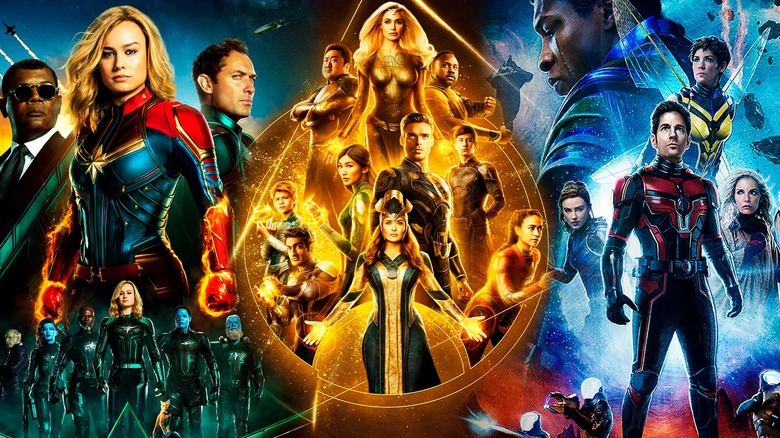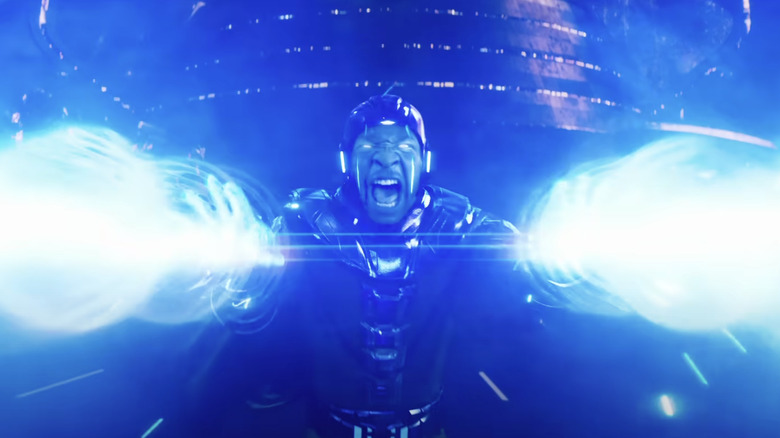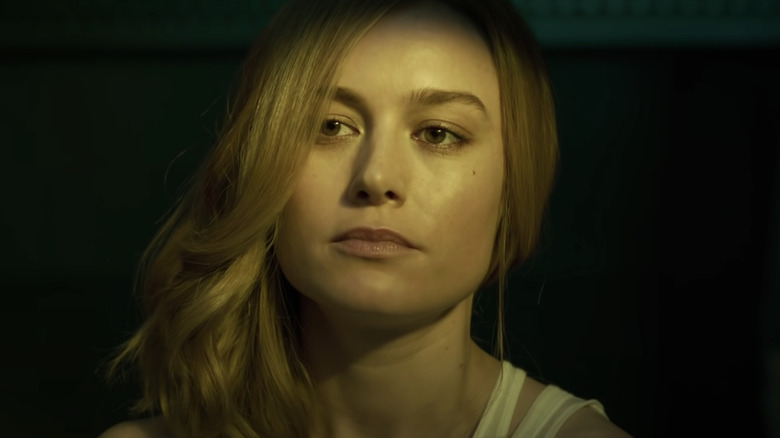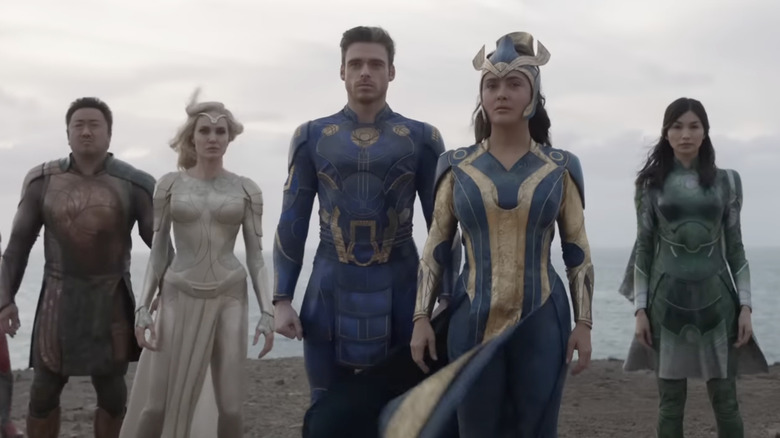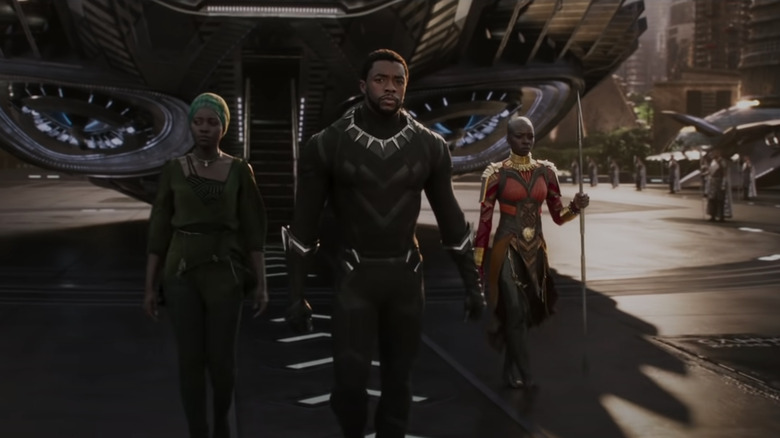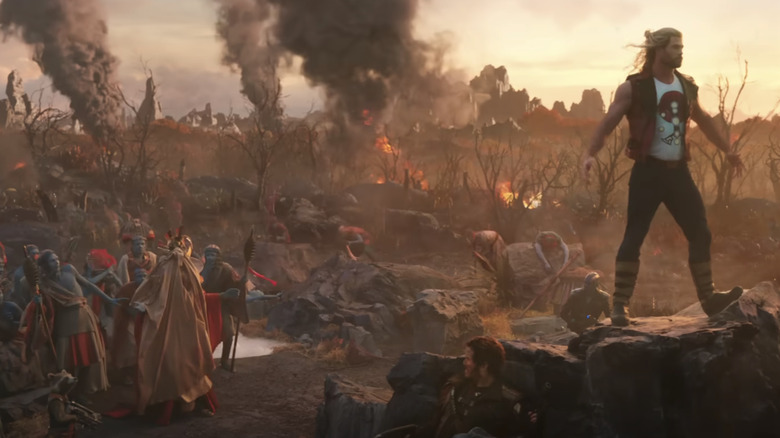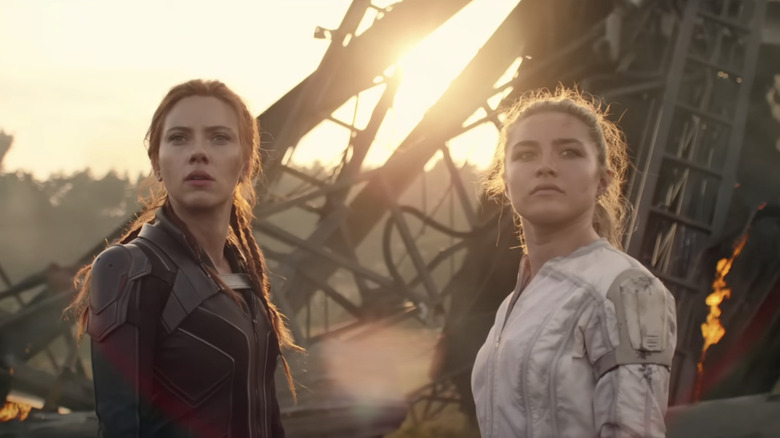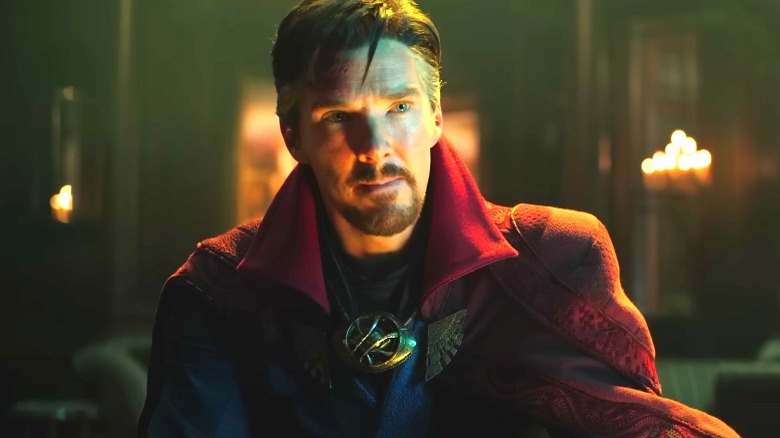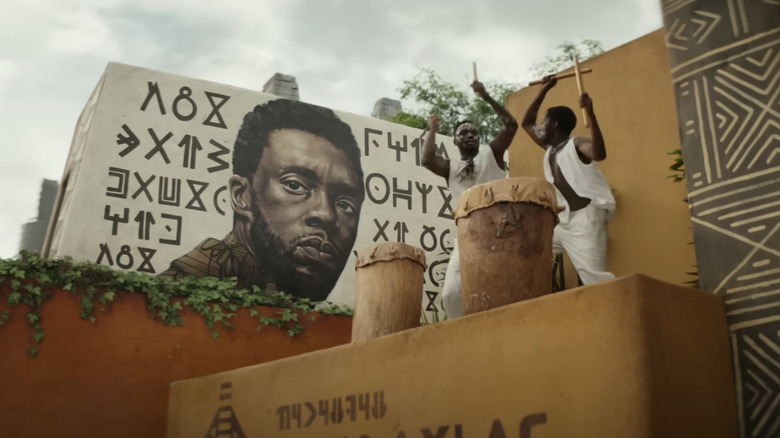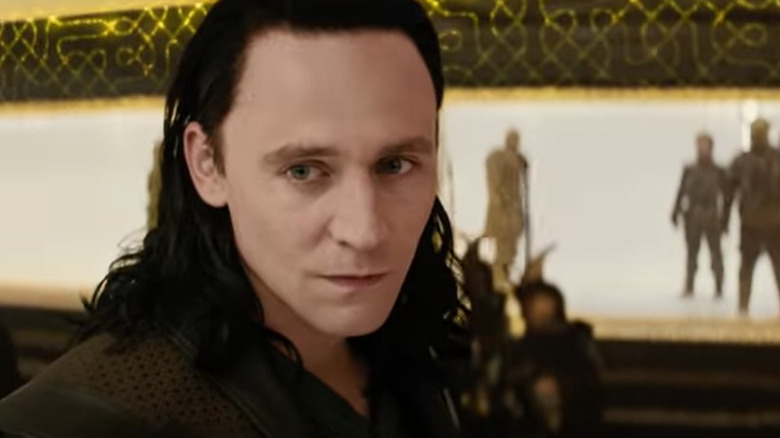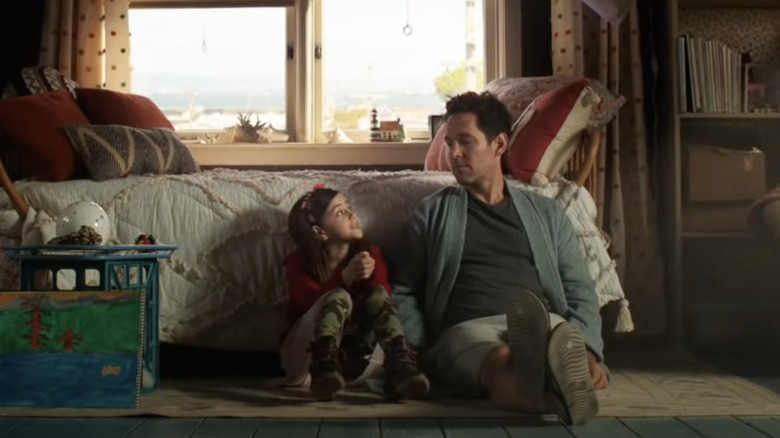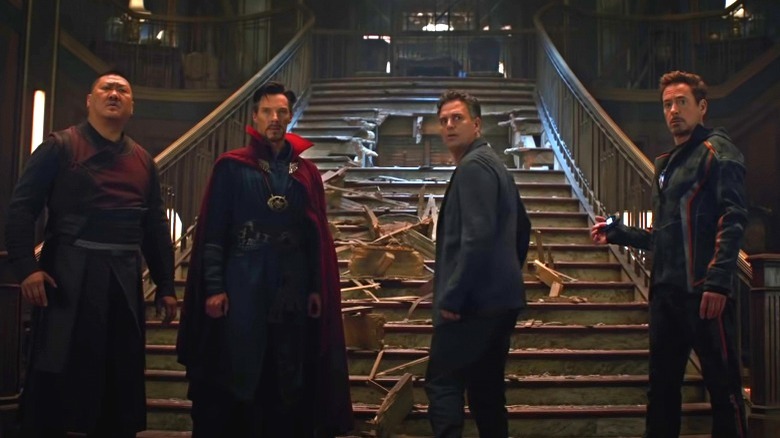Rotten Tomatoes' Biggest Divides Between Audience And Critic Scores In The MCU Explained
In a 2019 interview with Empire, Martin Scorsese said of the MCU films, "I don't see them. I tried, you know? But that's not cinema. Honestly, the closest I can think of them, as well-made as they are, with actors doing the best they can under the circumstances, is theme parks. It isn't the cinema of human beings trying to convey emotional, psychological experiences to another human being." Scorsese's pal Francis Ford Coppola backed him up, stating to the Guardian, "He's right, because we expect to learn something from cinema, we expect to gain something, some enlightenment, some knowledge, some inspiration."
Rotten Tomatoes (RT) has its detractors, too. With the lackluster critical response to the MCU's latest film, "Ant-Man and the Wasp: Quantumania," and discrepancies on RT widening between critical and audience reactions, questions about both the MCU and RT have once again been raised. Who are the Marvel films for, anyway? And is RT a fair system for rating them? RT has long been criticized for being too blunt of an instrument that squelches thorough, well-crafted reviews. With other review aggregators like Metacritic and Letterboxd gaining out there, is RT — with its simplistic representation of critical and audience consensus — in danger of becoming irrelevant? Let's take a deeper look into how the MCU has fared within this helpful, if flawed, rating system.
Ant-Man and the Wasp: Quantumania (2023)
The divide between critics and audiences on "Quantumania" – a whopping 35% – is, at press time, the MCU's largest to date, with critical response at 48% and audiences at 83%. Why? Critics have pointed out that "Quantumania" is too much of a departure from prior "Ant-Man" films, which balance superhero theatrics with the story of divorced dad and recent parolee Scott Lang (Paul Rudd) trying to repair his relationship with daughter Cassie, and his friendship with buddies Luis, Dave, and Kurt. Dominated by CGI, "Quantumania" contains the extended Lang-Pym-van Dyne family, but the dynamic is strangely absent. Glen Weldon of NPR typified the critical response: "Scott's entire personality, the whole of his character, is defined thus: 'I love my daughter Cassie. Where is Cassie? What have you done with Cassie?'" But eye candy is eye candy, and what's here is clearly making fans happy. Verified reviewer "Douglas" stated, "Full of great special effects... To see the quantum world come to life was fun. My kids loved it." Reviewer "David J" took aim at the critics, stating, "They're ruining the movie industry. The movie is definitely worth watching." "Tina B" asserted, "I'm not sure what people are complaining about as far as CGI. Is everyone now an expert on CGI?" The film locked down an opening three-day total of $106 million (domestic), besting "Captain America: The Winter Soldier" ($95 million), "Guardians of the Galaxy" ($94 million), and "Spider-Man: Far from Home" ($92.4 million).
Captain Marvel (2019)
"Captain Marvel" may have been a film that critics were predisposed to enjoy, given it was directed by indie darlings Anna Boden and Ryan Fleck, but their response (79%) was tepid at best. The London Standard's Matthew Norman crowed, "There's a new boss in town," the BBC's Caryn James found it "good enough to satisfy the series' built-in audience"; Mark Kermode thought it was "perfectly fine"; Mick LaSalle at the San Francisco Examiner lamented, "Good thing it's still March. 'Captain Marvel' would have made a weak start to the summer blockbuster season"; and, as Matthew Rozsa of Salon put it, "The breakout character may wind up being an adorable cat named Goose." Audiences (45%) were considerably less keen, put off by the film's confusing timeline, de-aging effects on Samuel L. Jackson's Nick Fury and Clark Gregg's Agent Colson, a lack of familiarity with the character, and, perhaps, an unhealthy dose of sexism. With 100K audience reviews (vs. 50K on gold-standard films from the same era, like "Endgame," "Infinity War," and "Black Panther"), only a single page of which is "verified," review bombing is apparently in effect. Verified audience member "Desmond B" wrote, "They completely emasculated the Nick Fury character to make Captain Marvel look good"; another, "metalmonk," claimed the film was "pointless pandering to a non-existing demographic"; and a couple anonymous reviewers claimed, "Brie Larson put too much of her own obtuse personality into the film" (how would anybody even know that?) and "Smug self righteous overpowered girl hits things a lot."
Eternals (2021)
Jack Kirby's Eternals, who made their first appearance in 1976, arrived in what is essentially the MCU's only "bottle" film in November 2021, resulting in a collective shrug from audiences and critics. Perhaps even more obscure (to casual fans) than the Guardians of the Galaxy, the Eternals are a group of super-powered beings whose one job over the course of 7,000 years is to fight the Deviants, a race of beasties hell-bent on killing Earth's apex predators, which would stop the birth of Celestials, which would ... be a bad thing? Right? Or no? Anyway, with an international cast including Salma Hayek, Angelina Jolie, Richard Madden, Gemma Chan, Don Lee, Kumail Nanjiani, Barry Keoghan, Kit Harington, and Brian Tyree Henry, the "Eternals" seemed poised to become the MCU's new breakout stars. And with Oscar winner Chloé Zhao ("Nomadland") directing, what could go wrong?
Unfortunately, quite a bit. The film's lengthy runtime, confusing chronology, and stilted dialogue did not go over well. On RT, audiences (77%) appreciated the film more than critics (47%) like Vulture's Angelica Jade Bastién, who wrote, "With 'Eternals,' Marvel proves itself to be nothing more than a staid, lumbering black hole." Verified members were more optimistic, like "Ben" who stated, "Don't understand the hate for it at all. Film introduces whats basically a whole separate universe into the current Marvel canon, and does it fairly well."
Black Panther (2018)
The first and only MCU film to receive an Oscar nomination for best picture, "Black Panther" sports a 17-point differential on RT, with critics (96%) appearing to prefer it far more than audiences (79%). Closer inspection exposes a couple shortcomings of the system: racist responses and reviews of the wrong film. "Overpraised due to an all-black cast," one reader wrote in September 2022; "Ethan J" missed the mark entirely, claiming, "I understand it's a Marvel film, but flying sea people that get around on whale back is a little bit too silly." Like "The Last Jedi" before it, and "Captain Marvel," "Black Panther" was subjected to review bombing by fringe groups due to the presence of characters of color. This phenomenon was caught by Rotten Tomatoes, which instituted changes in time for the sequel, "Wakanda Forever," but as mentioned, that didn't stop audiences from trashing that film; they just posted their reviews on the original.
Fortunately, on the strength of its reviews and performances, "Black Panther" became the third highest-grossing entry in the MCU ($700 million, and that's only the domestic box office). With a stellar ensemble led by the late Chadwick Boseman, a worthy villain in Michael B. Jordan's Killmonger, and crackling performances by Lupita Nyong'o, Daniel Kaluuya, Letitia Wright, Danai Gurira, Sterling K. Brown, and Angela Bassett, "Black Panther" lives up to the hype, with world-building unlike anything seen before in the cinematic universe.
Thor: Love and Thunder (2022)
While "Thor: Love and Thunder" delivered the requisite laughs and a kick-ass soundtrack, the film suffers when compared to "Thor: Ragnarok," also directed by Taika Waititi, who probably should have cut back on a project or two when making this film. "For a movie seemingly made with the sole purpose of inserting as many goofy gags per minute as possible while employing a healthy dose of vivid colors and rousing [Guns N' Roses] hits, 'Love and Thunder' is shockingly lethargic," said Adam Kempenaar of Filmspotting, and while audiences (77%) found the film more pleasing than critics (63%), it doesn't seem to capture the lightning-in-a-bottle feel of "Ragnarok," despite the presence of Chris Hemsworth, Natalie Portman, the Guardians of the Galaxy, and Christian Bale playing the diabolical Gorr the God Butcher.
Not all verified audience members found it as awful as "ole" ("Bale was the only bright spot in this ridiculously stupid movie. The creators of this movie should be embarrassed."); others simply damned it with faint praise, with "Philip" claiming, "Not quite as good as 'Ragnarok,' but probably the next best Thor movie," and another, ZRO, declaring this to be the "third best Thor movie."
Black Widow (2021)
"Black Widow" fared better than "Love and Thunder" in terms of critical and audience response. Critically, the film (which was delayed due to COVID-19) was deemed fresh at 79%, with audiences averaging out at 91% – a 12-point difference. The reason for the gap? Many critics complained that Natasha Romanoff (Scarlett Johansson) wasn't a character crying out for a standalone film. Despite the presence of a buoyant Florence Pugh as Natasha's sister, Yelena Belova, Maya Phillips of the New York Times claimed the film "never feels more than just a footnote in the story, a detour that holds no weight in the larger MCU narrative, except to set up Yelena for a larger role in the future." Fans also fell for Yelena, but sensed her purpose as Phillips had; verified audience member Frederick C attested, "Lots of action with wry humor mixed in. Good for backstory... Obviously a large part of this movie was to introduce her adopted sister for the 'Hawkeye' series." Indeed, Pugh almost stole this film from Johansson, then almost walked off with "Hawkeye"; she is due to appear in the upcoming "Thunderbolts" with "Black Widow" characters Red Guardian (David Harbour) and Taskmaster (Olga Kurylenko).
Doctor Strange in the Multiverse of Madness (2022)
The 11-point difference in the RT scores for "Doctor Strange in the Multiverse of Madness" feels right, given the film essentially met expectations but didn't exactly exceed them. Despite the presence of Benedict Cumberbatch, Elizabeth Olsen, Rachel McAdams, Benedict Wong, Xochitl Gómez, and a host of cameos whose presence feels more like a tease than anything else, "Multiverse" was a strange amalgam of MCU action and Sam Raimi's distinct, in-your-face directorial style, which seemed to battle rather than complement each other. Once again, fans (85%) enjoyed the film way more than critics (74%), although neither group was overjoyed with the film's mix of CGI world-building, multiple characters and plot strands, and multiversal weirdness. In Little White Lies, Hannah Strong pointed out the schizoid nature of it all, noting, "While Raimi injects as much soul into this sequel as the Marvel blueprint will allow, it's difficult to see the film as anything other than a cog in a bigger machine." Verified audience member "Mark A" also captured the mixed response, stating, "The movie was confusing, so much happening at once, nearly fell asleep. That said, it was entertaining." Still, excitement about those cameos, and a proper setup via TV's "WandaVision" propelled the film into the MCU's top 10 domestic grossers, pulling down $411.3 million vs. the original "Doctor Strange" film's take of $232.6 million.
Black Panther: Wakanda Forever (2022)
Given the ecstatic response to the original "Black Panther," it seems almost inevitable that the film's sequel might fall short, especially following the untimely passing of its star, Chadwick Boseman. And indeed, thanks to another overstuffed MCU plot and CGI-heavy final battle, and a certain amount of superhero fatigue, the film does not rise to the level of its predecessor (which would seem to explain the film's 84% response by critics). Still, there is much to admire in "Wakanda Forever," such as its legion of powerful female characters, led by Oscar nominee Angela Bassett, its inclusion of same-sex relationships, and incorporation of both Aztec and Mayan cultures as embodied by the character of Namor (Tenoch Huerta). Meanwhile, audience enthusiasm added up to a 94% score.
Reviews that typify the schism include that of Kyle Smith in the Wall Street Journal, who opined, "After a spate of manic superhero blockbusters that ricocheted from one digital spectacle to another, this one takes its time with character and plot but doesn't develop either to any satisfying degree." Audiences rallied to the franchise's defense, with verified reviewer "Hampton" calling the film a "great cinematic experience" with "solid cross-cultural conflict and resolution story-line. Always cutting edge tech and positive images, ethics espoused by Black characters. Inspirational. Good prodigy seeding for sequel!" (Indeed, the film ends on a hopeful note that the Panther line will continue.)
Thor: The Dark World (2013)
Audiences and critics were again at odds on "Thor: The Dark World," the 2013 sequel to Kenneth Branagh's "Thor," helmed this time by Alan Taylor, best known for his work on "The Sopranos" and "Game of Thrones." Not only does the film eschew what worked about the first one, it throws in heaps of CGI characters and sidekicks about whom we know little (including Thor's own mother, played by Rene Russo), drawing the following rebuke from the Philadelphia Inquirer's Stephen Rea: "Its monsters and angry armies and visual effects are interchangeable with Peter Jackson's Tolkien pics, with 'Clash of the Titans,' with 'The Avengers,' with 'Man of Steel,' and on and on." Critics averaged out at 66%, the fourth lowest rated MCU entry to date (though three points higher than 2022's "Love and Thunder"). The film also made $25 million more domestically than its predecessor, perhaps due to fans who bestowed a 75% rating — enough to warrant a standing box of popcorn. "Logan O" typified the response of faithful MCU fans who loved Tom Hiddleston but caught "The Dark World" more out of duty than anything else: "This movie is better than the first one, but... this is just a pit stop to go to other great movies in the MCU. Loki is the best part of this movie."
Shang Chi and the Legend of the Ten Rings (2021)
The MCU's first and only film thus far with an Asian lead (Simu Liu), an Asian American director (Destin Daniel Cretton) and writer (David Callaham), "Shang Chi" might not have the astronomical box office numbers of "Black Panther" or "Avengers: Endgame," but it does have terrific RT averages from critics (91%) and audiences (98%).The film earns points for turning a stereotype from the comics into a believable character and injecting much-needed humor via Awkwafina's Katy and Benedict Wong's, er, Wong. It's also got some terrific fight scenes, and it finally justifies the existence of Ben Kingsley's Trevor Slattery from "Iron Man 3." Still, critics were turned off by the climactic battle, which succumbed to the MCU's tendency to go big or go home (in this case, an honest-to-goodness Kaiju fight). Oliver Jones, in the Observer, stated, "'Shang-Chi' certainly deserves credit as a groundbreaking step of representation in mega-budget filmmaking. You just desperately wish that the terrain it treads upon didn't feel so safe." For the most part, audiences didn't care, with verified reviewer "Damen H" crowing, "The best fight choreography in the entire MCU. Great intro for a really dope character."
Ant-Man and the Wasp (2018)
"Ant-Man and the Wasp" is a sequel to a film that no one expected to be a hit, especially after that film's original director (Edgar Wright) was replaced by journeyman Peyton Reed. But a hit "Ant-Man" was, justifying a follow-up in which Hope van Dyne's Wasp teams up with Scott Lang's Ant-Man. The resulting film feels as vital as the original, with Scott's buddies Luis, Kurt, and Dave along for the ride and the MCU debuts of FBI agent Jimmy Woo (Randall Park), Bill Foster (Laurence Fishburne), and Ghost (Hannah John-Kamen). Though Wasp would largely be jettisoned from the next film in the franchise (see "Quantumania"), here Hope plays a pivotal role, aiding her father Hank Pym (Michael Douglas) in opening a tunnel to rescue Hope's mother Janet (Michelle Pfeiffer) from the Quantum Realm. Critical average certified the film fresh at 87%, while audiences were slightly less impressed, clocking in at 80%. Perhaps this was inevitable, as the film had the misfortune to follow "Avengers: Infinity War." The Boston Globe's Ty Burr summed up the response, writing that the film "is disposable pop trash, not worth taking seriously for a moment, and therefore eminently worthy of your attention at this moment." One anonymous audience member concurred, pronouncing, "A great summer family flick, which is needed because audiences needed a palate cleanser after the emotional roller-coaster that was 'Avengers: Infinity War.'"
Avengers: Infinity War (2018)
It's hard to believe, but the $2 billion global box office smash "Avengers: Infinity War" only fetched an 85% critical score on RT, while audiences (at 92%) gobbled up this "more is more" Russo brothers' production, whose poster may feature the greatest number of characters ever shoehorned into a vertical rectangle. "Avengers: Infinity War" is, in many ways, the culmination of 19 films that had meticulously planted seeds (or is it stones?), and those who had eagerly followed along were richly rewarded as the threads came together. Puppet master Thanos finally steps out of the shadows, and Earth's mightiest heroes had their hands full, putting aside the differences that had arisen in "Civil War" (2016) to fight a cosmic threat that, at least in this film, gains the upper hand. The Russos make a number of audacious choices, with that bummer of an ending, and there's no question that the cast and creatives were firing on all cylinders. So which critics weren't impressed? Those honors go to Ben Sachs of the Chicago Reader, who complained, "With so many characters to cover, [the Russos] have no time to develop any of them, and the action set pieces are all by the numbers"; and The New Yorker's Anthony Lane, who opined, "At stake, as ever, is the fate of the universe. Why must it always be the universe? What's wrong with the fate of Hackensack?"
